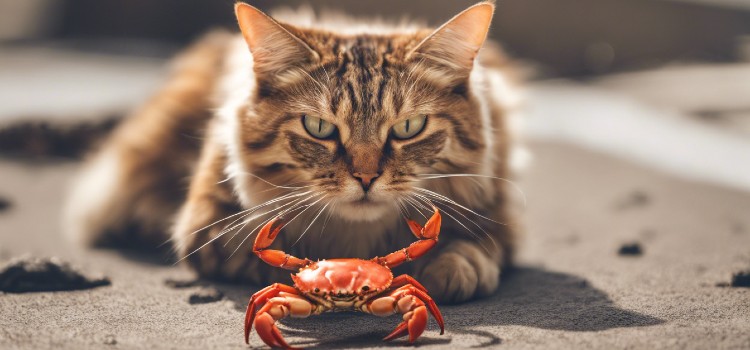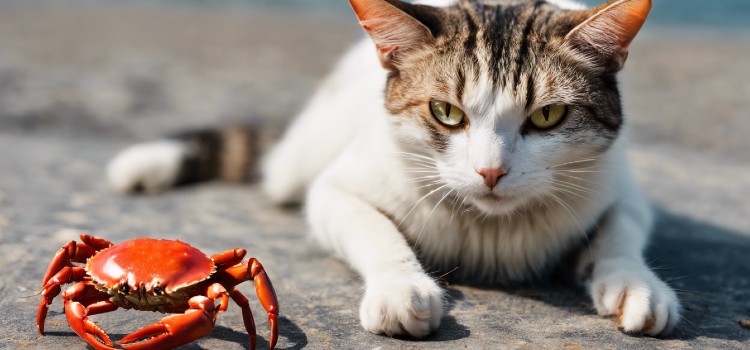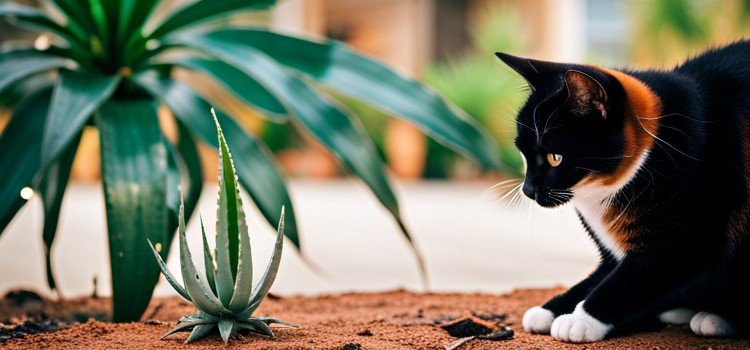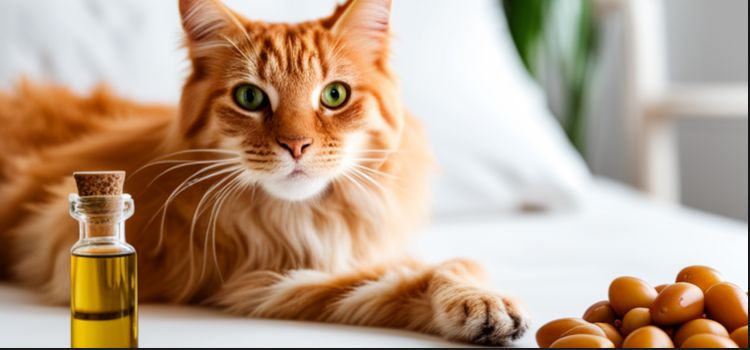As an Amazon Associate committed to the mission of improving the lives of our readers, Live-Clear.com receives a small commission from eligible purchases made through our affiliate links. This revenue enables us to keep producing insightful articles and other material.
Yes, your cat can eat crab, but in moderation. Cats can safely consume small amounts of crab meat, as it provides them with essential nutrients like protein and omega-3 fatty acids.
However, it is crucial to ensure that the crab is cooked thoroughly, with no added spices or seasoning, as some herbs and spices can be harmful to cats. Additionally, it is important to remove any shells or bones, as they can pose a choking hazard.

As with any new food, it’s best to introduce crab gradually and observe your cat for any adverse reactions. Consulting with your veterinarian is always recommended before making any significant changes to your cat’s diet.
Feline Nutrition Basics
Cats have unique dietary needs that differ from humans and other animals. Understanding their nutritional requirements is essential for maintaining their overall health and well-being.
Cats are obligate carnivores, meaning that their bodies are designed to primarily process animal protein. They require a diet rich in high-quality protein to thrive. While cats can eat a variety of foods, it’s important to note that not all human foods are safe for them. In fact, certain foods like chocolate, onions, and grapes can be toxic to cats.
| Protein | Cats need protein for muscle development and overall health. Good sources of protein for cats include chicken, turkey, and fish. |
| Fat | Fat provides essential fatty acids and energy for cats. It helps maintain a healthy coat and skin. Sources of fat for cats include poultry fat and fish oil. |
| Carbohydrates | Cats have a limited ability to digest carbohydrates. While they don’t require a high amount of carbohydrates, some can be beneficial for energy. Good sources of carbs for cats include rice and sweet potatoes. |
When choosing cat food, it’s important to look for options that are specifically formulated for feline needs. A well-balanced cat food should contain optimal levels of protein, fat, and essential nutrients. Additionally, providing fresh water and avoiding excessive treats can help maintain feline health.
Safe And Unsafe Foods For Cats
Cats can safely eat crab meat as an occasional treat, as long as it is cooked and free of seasonings or additives. However, it is important to remove any shells and avoid feeding them raw crab to prevent digestive issues.
Evaluating Common Human Foods
Feeding your cat a balanced and nutritious diet is crucial for their overall health. While cats have specific dietary needs, it’s important to be aware of the foods that are safe for them to consume and those that can pose risks.
Certain human foods can be safely shared with cats in moderation. Lean meats like crab can provide them with protein, but it should be properly cooked and boneless to avoid any potential hazards. Fish, such as salmon, can also be beneficial for cats due to its high omega-3 fatty acids content.
However, it’s essential to be cautious with what you offer your feline companion. Many human foods are toxic to cats and can have severe consequences. Foods like onions, garlic, chocolate, caffeine, and alcohol should never be fed to cats as they can cause serious health issues.
In conclusion, providing your cat with a well-balanced cat-friendly diet is crucial, and it’s best to consult with a veterinarian to ensure their nutritional needs are met while avoiding any harmful substances.
Can Cats Eat Crab: Dietary Considerations
Crab is a delicacy enjoyed by many humans, but can cats also indulge in this seafood treat? When it comes to feeding cats crab, there are a few important things to consider. While crab can provide some nutritional benefits to cats, it is essential to be aware of potential hazards as well.
Nutritional Benefits Of Crab For Cats
Crab meat is a good source of protein, which is crucial for a cat’s overall health. It also contains essential amino acids, vitamins, and minerals that contribute to a balanced diet for cats. Additionally, crab can provide omega-3 fatty acids, promoting a healthy skin and coat.
Potential Hazards Of Feeding Crab To Cats
Despite its potential benefits, feeding crab to cats may come with some risks. Some cats may be allergic to shellfish, including crab, leading to allergic reactions. Moreover, crab shells can pose a choking hazard or cause digestive issues if not properly prepared or removed.
How To Properly Introduce Crab Into A Cat’s Diet
If you decide to introduce crab into your cat’s diet, it is crucial to do so cautiously. Start by offering a small amount and observe your cat for any adverse reactions. Remove the shells and ensure that the crab is fully cooked to prevent any potential bacterial contamination. Consult with your veterinarian before making any significant changes to your cat’s diet.

Allergies And Seafood Sensitivities
Allergies and seafood sensitivities are common concerns for cat owners. Identifying allergic reactions in cats can be challenging, but it is important to be aware of them to ensure the well-being of our feline friends.
Cats are commonly allergic to seafood, including crab. Some cats may develop itchiness, skin rashes, digestive upset, or breathing difficulties after consuming seafood. It is crucial to monitor their behavior and physical symptoms closely to determine if they are experiencing an allergic reaction.
If your cat is allergic to crab or other seafood, it is vital to take precautions to avoid potential health issues. Avoid feeding your cat any seafood products, and carefully read ingredient labels to ensure they don’t come into contact with allergens accidentally.
Fortunately, there are alternative protein options available for cats with seafood sensitivities. Consult with your veterinarian to create a suitable diet plan that includes hypoallergenic cat food or other protein sources that are safe for your cat to consume.
Preparing Crab For Your Cat
When it comes to preparing crab for your cat, there are a few things you need to keep in mind. Firstly, make sure to remove the shell before serving it to your cat. This will prevent any potential choking hazards. Secondly, cook the crab thoroughly to eliminate any harmful bacteria that may be present. It is recommended to boil or steam the crab. Avoid using any seasoning or spices as they can be harmful to cats.
The best methods to cook crab for cats:
- Remove the shell.
- Cook the crab thoroughly.
- Avoid seasoning or spices.
When it comes to portion sizes and frequency of feeding, moderation is key. While crab can be a tasty treat for your cat, it should not replace their regular balanced diet. Offer small portions of cooked crab as an occasional treat, and monitor your cat’s reaction and digestion. If your cat eat crab, they may show signs of excitement, such as purring or licking their lips. However, every cat is different, so pay attention to any adverse reactions or digestive issues that may arise.

Navigating Seafood In Commercial Cat Food
Seafood flavors are a popular choice in commercial cat food, but understanding the ingredients in these products can be challenging. Labels on cat food can be confusing, but by deciphering them, you can ensure that your feline friend is getting a balanced diet. The role of seafood flavors in cat nutrition is important, as they provide a unique taste that many cats enjoy. However, it is essential to remember that cats should not solely rely on seafood as their diet. Commercial cat food products offer a convenient way to balance a cat’s diet, as they contain a variety of necessary nutrients. By reading and understanding cat food labels, you can make informed choices about the products you feed your cat, ensuring their overall health and well-being.
Monitoring Your Cat’s Health
Tracking changes after dietary adjustments is an important aspect of monitoring your cat’s health. As a responsible cat owner, it is crucial to observe any alterations in your cat’s behavior or physical well-being after introducing a new food or making adjustments to their diet.
If you notice any concerning changes in your cat’s overall health, such as excessive weight loss, lethargy, digestive issues, or changes in their coat quality, it is essential to consult a veterinarian. They can provide valuable insights into your cat’s nutritional needs and help determine if the dietary adjustments are suitable for their specific health requirements. Regular veterinary check-ups are crucial in ensuring that your cat is in good health and receiving a balanced diet.
You should also consider the long-term health implications of their dietary choices. While cats are obligate carnivores and thrive on a meat-based diet, it is important to provide a balanced and appropriate nutritional intake. A diet high in animal proteins, low in carbohydrates, and supplemented with necessary vitamins and minerals can contribute to your cat’s overall well-being.
Ultimately, monitoring and evaluating your cat’s health after dietary adjustments, along with regular veterinary visits, will enable you to make informed decisions about their diet and ensure their long-term wellness.
Interactive Mealtime For Feline Fitness
Feeding time for cats can be more than just putting down a bowl of kibble. Interactive mealtime is important for feline fitness, both physically and mentally. Engaging your cat with their food can help prevent boredom, encourage natural hunting behaviors, and provide enrichment.
| The importance of play in feline diet |
| Play is a vital part of a cat’s life, and it shouldn’t stop at mealtime. Incorporating interactive feeding toys or puzzle feeders can stimulate their natural instincts, promote exercise, and slow down their eating pace. Cats are natural hunters, and making them work for their food can mimic the thrill of the hunt. It adds challenge and mental stimulation to their routine, providing a well-rounded approach to their overall health. |
| Keeping mealtime interesting and healthy |
| There are various ways to keep mealtime engaging and healthy. Rotating different types of food, including wet and dry options, can prevent boredom and add variety to their diet. Offering small, frequent meals throughout the day can also mimic their natural hunting patterns and prevent overeating. Adding supplements, such as omega-3 fatty acids or probiotics, can support their overall well-being. Remember to consult with your veterinarian for specific dietary recommendations based on your cat’s age, weight, and health conditions. |
Conclusion
In conclusion, the question “Can Cat Eat Crab” revolves around the safety of incorporating crab into a feline’s diet. While some cats may enjoy seafood, it’s crucial to approach this with caution. Always consult with your veterinarian before introducing crab or any new food to your cat’s menu. Understanding the intricacies of a cat’s nutritional needs is vital for their well-being. Keep your furry friend’s health a top priority, and enjoy exploring safe and enjoyable treats together. For more insights on feline nutrition and dietary considerations, stay informed with our comprehensive guides.

Frequently Asked Questions Of Can Cat Eat Crab
Yes, If you fully cook crab without any seasoning or additives, it is safe for cats to consume. However, you should only give crab to your cat as an occasional treat and not as a regular part of their diet.
Remember to remove the shells and ensure it is boneless before feeding it to your cat.
Yes, cat can eat seafood. It is safe for them, but variety is key in their diet.
Cats and dogs should not eat crab as it can cause digestive issues and allergic reactions.
No, cats should not have crab sushi. It is not safe for them to consume.
Yes, cats can eat crab in small amounts. However, you should cook it thoroughly and avoid adding any seasoning.
While cats can indeed eat crab in moderation, it is crucial to prioritize their safety and well-being. Introducing crab to your feline friend’s diet can provide valuable nutrients and a flavorful treat. Ensuring that the crab is cooked properly, free from additives, and serving it in small, manageable portions is imperative. Always consult your veterinarian before significantly changing your cat’s diet, as individual sensitivities may vary. By exercising caution and responsible pet ownership, you can share the occasional crab indulgence with your cat, enhancing their dining experience without compromising their health. Remember, a balanced and tailored diet remains vital to keeping your beloved feline companion happy and healthy.
Amazon and the Amazon logo are trademarks of Amazon.com, Inc, or its affiliates.



